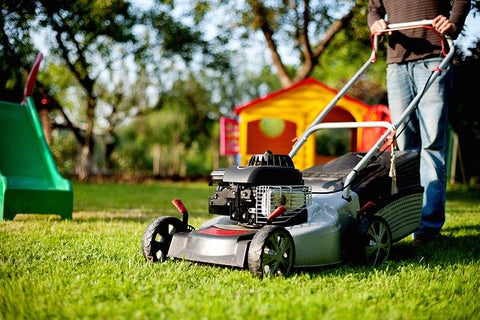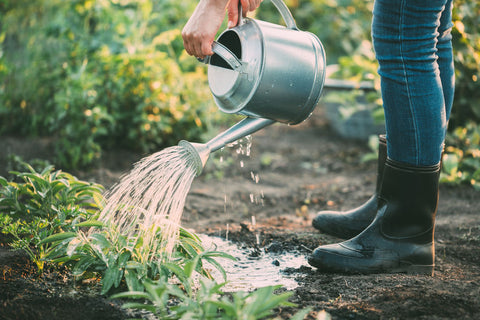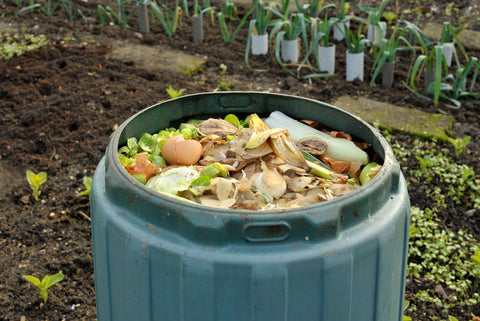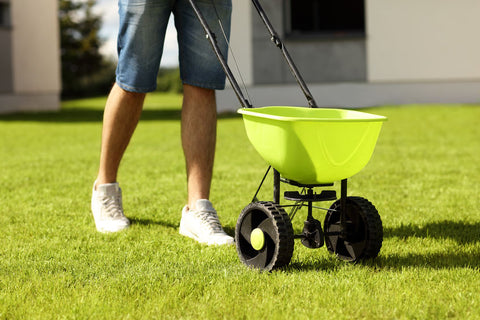We all love a green lawn, with soft lush grass to walk on, lie on, and overall, just to beautify the area we call "home."
Sadly, most conventional lawn care relies on potentially hazardous herbicides, pesticides, and fertilizers, all of which do some degree of damage to the ecosystem. To make matters worse, lawns don't produce food, yet they still tap into the world's fresh water resources.
Considering the United Nations has reported that by 2050, the world will begin to experience significant fresh water shortages, what can you do to take a "greener" approach to keeping your lawn beautiful?
Here are some suggestions to help you avoid possibly toxic chemicals while maintaining a more sustainable lawn:
Green Mowing

In case you don't know, the way and frequency with which you mow your lawn affect its health in the long term. In fact, keeping your lawn trimmed properly helps your grass fight back against pest and weed invasions, as well as retain enough water in the soil.
"Cool season" grasses (e.g., Ryegrass, Fescue, Bluegrass) can be kept at around 3 to 4 inches, while "warm season" grasses (e.g., St. Augustine, Zoysia, Bermuda), should be cut down closer to the soil, at around 1/2". Consult with a lawn care professional in your area for more specific guidelines.
While on the topic of green mowing, you should seriously consider changing our your gas-powered lawn equipment with the battery -operated alternatives that are now readily available.
Green Watering

As a species, we absolutely need fresh water in order to survive. Our fresh water supply affects just about every aspect of our lives, and we should always be mindful of the fact that it's a limited resource.
You don’t need to get rid of your lawn in order for it to be eco-friendly, but making its care more efficient and resource-conscious is your best "green" approach.
If you get a good amount of rain, you might not need to water much at all, but if you do need to water, how much water does your grass really need? Despite where you live and how much sun your lawn gets, your grass really only needs about 1" to 1.5" of water weekly, and the best time to water it is early in the morning. This way, more of the water is able to seep down into the soil to get to the roots, before the evaporation process begins in the heat of the day.
More water conservation tricks include:
- Utilizing a barrel to capture rainwater, which you can then use to water your lawn and landscape.
- Establishing a "grey water" distribution system, channeling all the runoff water from sinks, dishwasher, washing machine, bathtubs, etc. into your yard, so you can get the most out of your home's water usage.
Compost: Nature's Fertilizer

Lawns (and plants in general) consume the nutrients in the soil over time, so you need to do what you can to replenish them. Many conventional fertilizers you buy in the store can contain potentially hazardous ingredients, and in some cases, far too many excess nutrients that can damage the ecosystem.
Natural and organic fertilizers are your best bet to avoid harming the earth. The most common, affordable (and effective) fertilizer is compost, which you can buy pre-made, or make yourself with leftover organic scraps.
"Overseeding"

Sometimes you might notice "holes" or patches in your lawn, but there's an earth-friendly solution known as "overseeding."
All you need to do for effective overseeding is to spread grass seed around your lawn to help it grow thicker and healthier (especially in patchy areas). You need to be steady and conscientious in this treatment, however, so your lawn doesn’t become thick and lush in some areas and sparse in others. This might also be worth a conversation with a lawn care professional about.
Protect Your Yard and Garden Plants with a Plant-based Garden Spray
To help minimize the effects caused by weather, try an effective plant-based garden spray to address pests, mites, and fungi. Look for a garden spray that you can use for organic gardening, indoors and outdoors, and that offers contact kill and residual repellency, without leaving behind harmful residues.
Got any green, natural lawn care strategies? We want to hear about them! Comment below!

